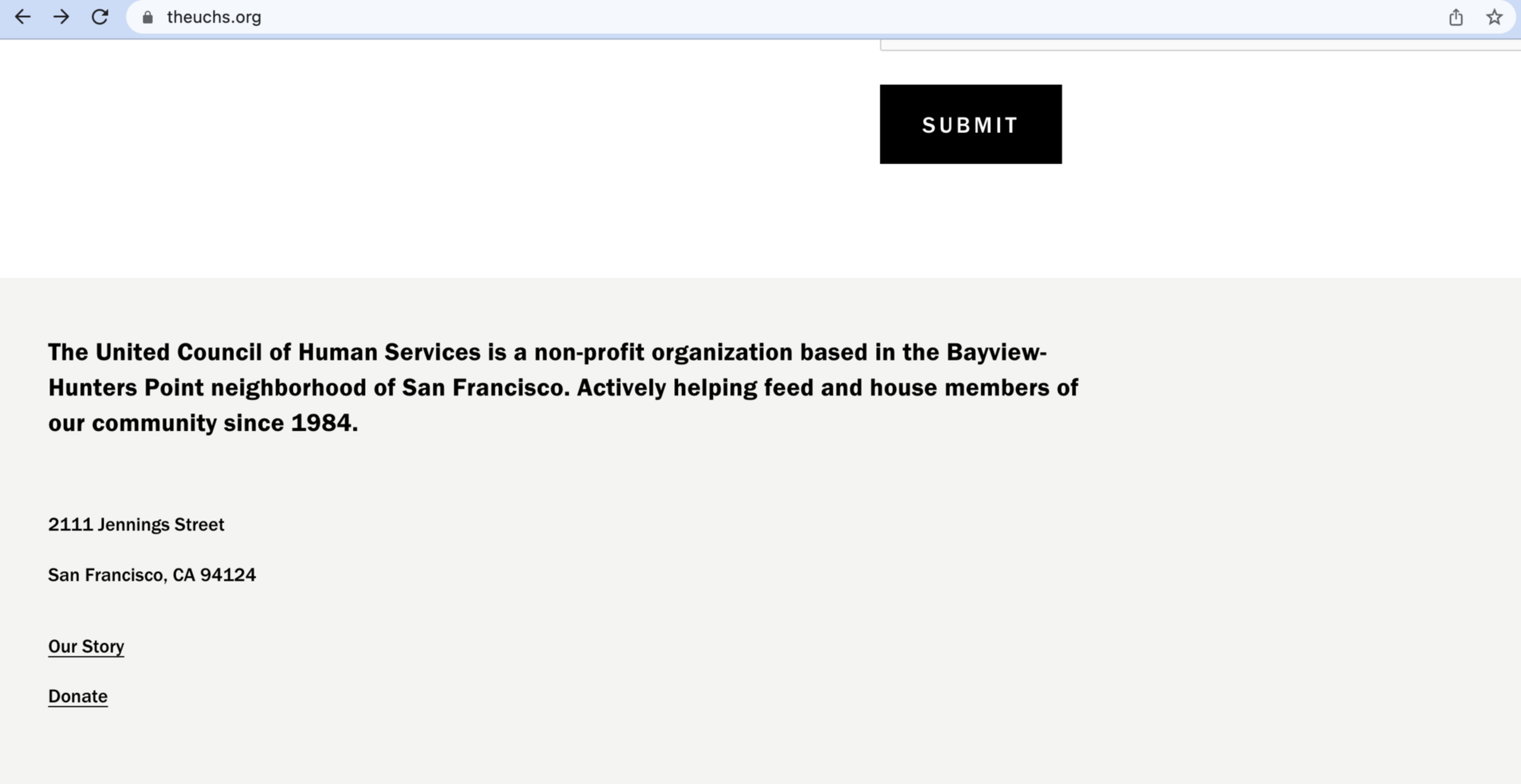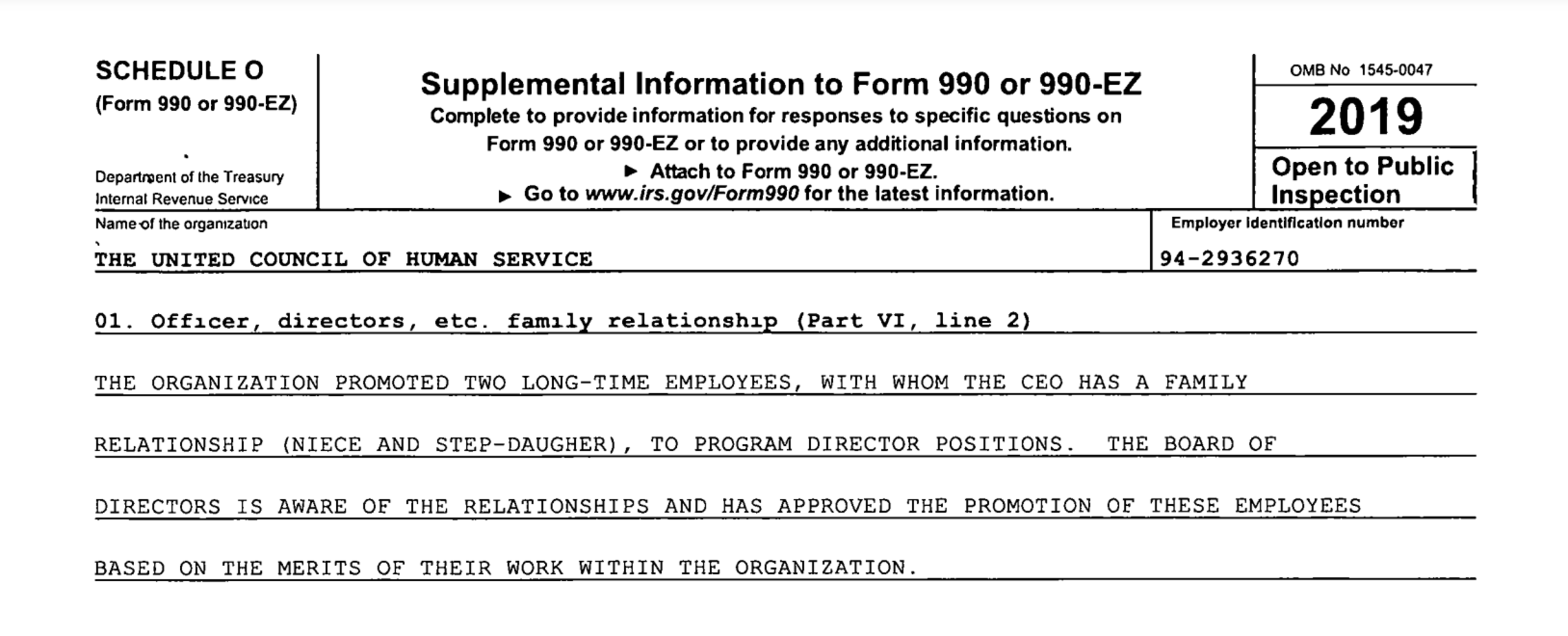City officials have spent the better part of this year scrambling to save a nonprofit that allegedly mismanaged money to house homeless people in one of San Francisco’s poorest neighborhoods after it received tens of millions of dollars in city and federal grants.
But there’s one big problem: The nonprofit suspected of financial misconduct, United Council of Human Services (UCHS), isn’t even a nonprofit.
On Tuesday, the California Attorney General’s Office confirmed to The Standard that it suspended the nonprofit status of UCHS—a nearly four-decade-old organization formerly known as Mother Brown’s soup kitchen—earlier this summer after the Bayview-based organization failed to respond to multiple requests for financial documentation and filing fees going back to 2017.
The AG’s Office instituted a new system in the last two years to update the status of charities that were chronically delinquent. Since that time, the office has suspended more than 5,000 charities and revoked the nonprofit status of more than 20,000, officials said.
An organization that has its nonprofit status suspended or revoked cannot solicit donations or operate as a charity in California, but the website for UCHS still identifies itself as a nonprofit and has a page set up for people to give donations.

From April through October, officials in the San Francisco Department of Homelessness and Supportive Housing (HSH) were working to keep UCHS afloat by finding a new fiscal sponsor to help assist and manage the flow of millions in grants—all while the organization, which runs housing, shelter and drop-in services for homeless individuals, failed to do the bare minimum to come into compliance.
HSH officials were unaware that the Bayview organization—whose CEO admitted to prioritizing housing for around 20 of her family, friends and employees—was no longer a nonprofit until contacted for comment for this story Tuesday morning.
Emily Cohen, a spokesperson for the agency, said UCHS’s transparency has been a serious concern since April, which prompted the agency to ask the City Controller’s Office to conduct an audit.
“I want to make it very clear that HSH noticed these problems,” she said.
A report released last week found a pattern of mismanagement and financial misconduct (opens in new tab), and City Controller Ben Rosenfield and City Attorney David Chiu wrote a letter to the FBI and District Attorney’s Office asking for criminal investigations because of financial impropriety.
In a statement Tuesday, Cohen said that HSH wants to continue working with United Council and its new fiscal sponsor, the Felton Institute, to “bring them into compliance and ensure proper fiscal management.”
HSH officials noted that Black and Brown households—the groups predominantly served by UCHS—face extreme disparities in housing and homelessness in San Francisco. Latino households make up 30% of the homeless population while only representing about 16% of the city’s residents, while African Americans make up 35% of the homeless while only comprising about 6% of the city’s residents.
“Ensuring that we have culturally relevant service providers is essential to successfully addressing homelessness and reducing the racial disparities of homelessness in all neighborhoods in our city,” HSH officials said.

Gwendolyn Westbrook, the CEO of UCHS, refused to answer questions by phone Monday on whether her organization was still in good standing as a nonprofit.
“Look it up,” she said before abruptly hanging up.
UCHS has received $28 million in grants to manage shelters and housing that include: Hope House Consolidated, Hope House for Veterans, the Bayview Drop-in Resource Center, Jennings Safe Sleeping Village and a shelter-in-place site at Pier 94.
DA spokesperson Randy Quezada said the agency is “declining to comment on current or potential investigations,” while an FBI official said the bureau was reviewing records related to the criminal investigation referral.
UCHS ran into trouble in April, when its fiscal sponsor of just two months—the Bayview Hunters Point Foundation—alerted the city that it did not feel comfortable working with Westbrook due to missing records and shoddy bookkeeping. HSH officials pleaded with the foundation to stay on until a new fiscal sponsor could be found—Felton Institute took over this work in October—while also asking the City Controller’s Office to launch an investigation into UCHS.
In April, the city stopped asking the federal government for reimbursements over fears that money granted to UCHS might have been misused.
Numerous city officials contacted for this story were dismayed that the city has bent over backwards to keep funding UCHS despite obvious financial issues—the organization also was the subject of a scathing audit back in 2017.
“You can’t keep burying your heads in the sand and saying this is the only people we can do business with,” Supervisor Aaron Peskin said.
‘Huge Red Flags’
In many ways, the warning signs of financial mismanagement should have been obvious if the city had done a cursory review of UCHS tax filings prior to February 2022, when the Bayview Hunters Point Foundation took over as a fiscal sponsor.
The Standard reviewed the UCHS 2019 tax returns (opens in new tab)—the most recently available documents filed with the IRS—with two experienced tax attorneys in the city. They said the records show a stunning level of “incompetence” and raise “huge red flags.”
Of the $5.6 million in expenses for that year, UCHS reported roughly $2.1 million under the ambiguous designation of “other.” The only detail explaining these “other” expenses was a note about Westbrook promoting her stepdaughter and niece to program director positions.

One of the attorneys also noted a “mysterious” liability for $467,337 that was documented as an adjustment to the year’s beginning budget. Both attorneys agreed that a charge of $10,000 to $20,000 could be explained as an understandable mistake, but a half-million-dollar adjustment would be monumental. UCHS reported an ending net balance of negative $511,000, meaning it was deeply in debt in 2020 as it continued to receive millions from the city.
“They’re running a professional deficit,” one attorney said, meaning they require timely ongoing funding to make sure they don’t default on their debts.
Additional issues were identified in the math used to account for other expenses.
Despite reporting that it spent nearly $200,000 on accounting fees in 2019, UCHS broke down its percentage of costs for program service, management and fundraising in exact 45-45-10 ratios, respectively, across the board. This exact split was recorded for salaries and wages, payroll taxes, accounting, office expenses and even insurance.
“The insurance—that’s just nonsense,” one attorney said. “None of the insurance [expenses] goes to fundraising.”
Since the audit was released last week, supervisors Ahsha Safaí and Catherine Stefani have called for an inquiry into all nonprofits dealing with homelessness in the city. Voters in November passed Proposition C, which will create its own review mechanisms and a new body to oversee the HSH agency.
Editor’s Note: The Attorney General’s Office clarified on Wednesday that the United Council of Human Services had its nonprofit status suspended in June, and a full revocation could occur after a year has passed.
